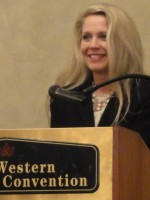 The school year is in full swing with teachers back in their classrooms. Some folks might mistakenly believe that teaching is an easy job. Not me. Twenty-five years ago, on my first morning as a substitute teacher, I vividly remember standing in front of a class of about 25 high school students at multi-academic levels waiting for my instruction. Over and over the school bell rang that stressful day signaling the next period and at least 20 new faces would fill a vacated desk. Some of the students looked bored, some seemed intent on learning, while others were openly rebellious.
The school year is in full swing with teachers back in their classrooms. Some folks might mistakenly believe that teaching is an easy job. Not me. Twenty-five years ago, on my first morning as a substitute teacher, I vividly remember standing in front of a class of about 25 high school students at multi-academic levels waiting for my instruction. Over and over the school bell rang that stressful day signaling the next period and at least 20 new faces would fill a vacated desk. Some of the students looked bored, some seemed intent on learning, while others were openly rebellious.
Thus began my year as a substitute middle/high school teacher. It’s necessary to qualify that I am not a teacher by training. Rather I was an unemployed journalist who had a rose-tinted vision of imparting knowledge to young people. My idealism about changing the world was quickly diminished when after a few weeks of subbing my goal turned to that of survival.
The truth is many substitutes never really get the chance to teach, since thankfully an absent teacher’s lesson plans include: a relevant movie, worksheet, or directions for a project already in progress. Seasoned educators know that subs are babysitters, just like veteran reporters know that recently graduated journalists are cubs. It’s a new substitute’s job to prove oneself, but that can be very difficult moving from school to school and classroom to classroom. For example, that first fall a particularly boisterous group of high school boys threatened to end my budding teaching career. While trying to take attendance, they proudly revealed that they had gotten rid of their last sub, “an elderly gentleman with purple hair” by flying handmade paper airplanes at him.
The mischievous teens laughed in mocking delight as they encircled me, while I frantically maintained that they were to “take their seats.” Their loud taunting voices were suddenly silenced when their principal mysteriously appeared in the back of the room offering them two for one Saturday School if they continued to be disrespectful. Order immediately returned, because most high school students want to avoid punishment at all costs. Sadly, some parents enable their children to disregard school rules. This can become a teacher’s worst nightmare, when a student is empowered by the fact that they will have no consequences at home for acting up.
In my short tenure, I observed innocent teachers threatened for something as simple as denying a disruptive student a hall pass or even occasionally being pelted with undeserved obscenities by an unruly youth. I withstood my own daily teaching tests pretty well, choosing to focus on the majority of obedient, compassionate and helpful students who could be found in every classroom.
Although by early spring, it was the middle-school students who convinced me that I would have to end my career as a nomadic sub. Most of them didn’t seem to understand consequences like the high-school students did. Therefore, pandemonium broke out once when I was placed in a classroom with 15 middle-schoolers, 15 sewing machines, and a missing bobbin.
 My young charges began to angrily blame each other for the missing bobbin, while imploring me to mediate the situation. In exasperation, I said, “What is a bobbin?” My admission of ignorance drew a look of disdain from the teens and tweens who showed me the small sewing machine part wrapped with colored thread. After settling the dispute, I leaned against the blackboard and gazed heavenward, silently asking, “God, what have I done to deserve this?” My answer came in the lessons gleaned during that memorable year.
My young charges began to angrily blame each other for the missing bobbin, while imploring me to mediate the situation. In exasperation, I said, “What is a bobbin?” My admission of ignorance drew a look of disdain from the teens and tweens who showed me the small sewing machine part wrapped with colored thread. After settling the dispute, I leaned against the blackboard and gazed heavenward, silently asking, “God, what have I done to deserve this?” My answer came in the lessons gleaned during that memorable year.
Even though my brief teaching career ended shortly after the “sewing machine” incident, I learned that the life of a caring teacher is anything but easy or carefree. Their evenings are filled with grading papers, creating lessons, and doing all the things they can’t get done in a classroom filled with boisterous kids. This experience also prepared me for life as a school administrator’s wife, since I married one the following summer.
Headlines occasionally report the story of an unscrupulous mentor who lacks integrity and takes advantage of an unsuspecting youth, but these isolated incidents are the exceptions to the rule. Most educators invest countless unseen hours striving diligently to make the world better, one student at a time. My deepest respect goes out to teachers, knowing firsthand how difficult their path can be, because I was once honored to “walk a mile in their shoes.”
 Christina Ryan Claypool is an Amy award-winning freelance journalist, who is the author of the inspirational book, “Secrets of the Pastor’s Wife: A Novel”. She has been featured on CBN’s 700 Club and Joyce Meyer Ministries Enjoying Everyday Life TV show. Contact her through her website at www.christinaryanclaypool.com.
Christina Ryan Claypool is an Amy award-winning freelance journalist, who is the author of the inspirational book, “Secrets of the Pastor’s Wife: A Novel”. She has been featured on CBN’s 700 Club and Joyce Meyer Ministries Enjoying Everyday Life TV show. Contact her through her website at www.christinaryanclaypool.com.

 If you are young person today, there are probably a lot of things that annoy you. If you are not young, then you have to understand that over the last decade the word, “annoy” has taken on a whole new meaning. At first, I was intrigued by the way a teenager angry at their parents, teacher, or a peer could say, “They are so annoying,” and make it sound like a degrading profanity. If you listen closely, you will find that some teens find most of life’s frustrating circumstances “annoying” like having to do homework, clean their room, or even a bad hair day.
If you are young person today, there are probably a lot of things that annoy you. If you are not young, then you have to understand that over the last decade the word, “annoy” has taken on a whole new meaning. At first, I was intrigued by the way a teenager angry at their parents, teacher, or a peer could say, “They are so annoying,” and make it sound like a degrading profanity. If you listen closely, you will find that some teens find most of life’s frustrating circumstances “annoying” like having to do homework, clean their room, or even a bad hair day. I was more than annoyed; I was truly heartbroken, concerned that these bright students were a precursor of the future. This topic is personal for me, because I’ve had to battle ongoing distractions as a public speaker for the past two decades. I’ve talked through screaming babies, women filing their nails, teenagers looking bored to death, and ringing cell phones. It’s difficult to explain away distracting phones, yet I have always comforted myself with the knowledge that the mom of the screaming baby or the woman manicuring her nails might need to hear what I’m saying. Same way, with a seemingly uninterested teen, since many times, hurting adolescents are listening intently but have to act bored for fear of being labeled uncool.
I was more than annoyed; I was truly heartbroken, concerned that these bright students were a precursor of the future. This topic is personal for me, because I’ve had to battle ongoing distractions as a public speaker for the past two decades. I’ve talked through screaming babies, women filing their nails, teenagers looking bored to death, and ringing cell phones. It’s difficult to explain away distracting phones, yet I have always comforted myself with the knowledge that the mom of the screaming baby or the woman manicuring her nails might need to hear what I’m saying. Same way, with a seemingly uninterested teen, since many times, hurting adolescents are listening intently but have to act bored for fear of being labeled uncool.